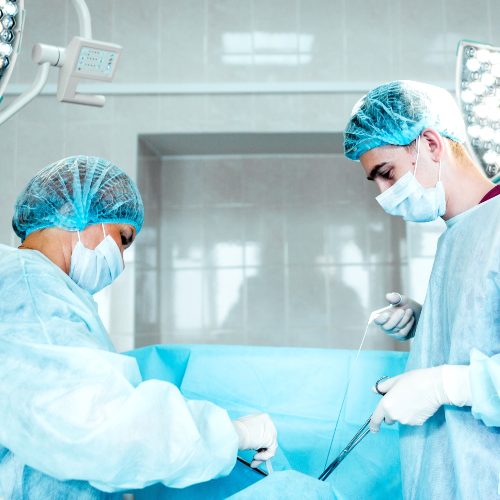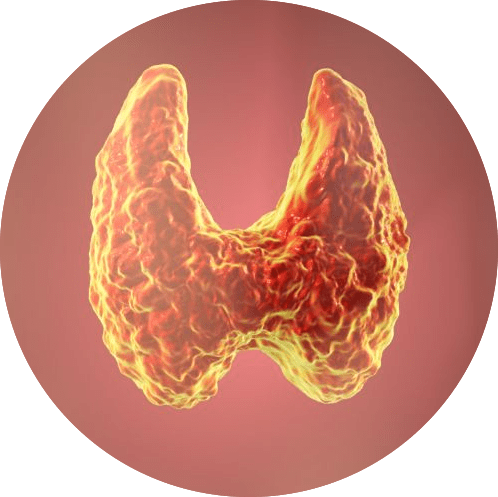Thyroid Surgery Adelaide
Dr Samuel Rice – MBBS, FRACS
Specialist Thyroid Surgeon
Learn more about the thyroid gland and thyroid surgery.
What happens when the Thyroid gland does not function properly
The thyroid gland makes hormones that keep organs in your body regulated and running properly. It also controls the way you use energy such as how you burn calories and how fast your heart beats.
If you have an overactive thyroid it’s called hyperthyroidism or under-active thyroid, called hypothyroidism.
Hyperthyroidism – Happens when your thyroid gland makes more thyroid hormones than your body needs.
Typical symptoms for hyperthyroidism may include weight loss, fast heart rate, high irritability/nervousness, muscle weakness and tremors, infrequent menstrual periods, sleep problems, eye irritations and heat sensitivity.
Hypothyroidism – Occurs when your thyroid gland doesn’t make enough thyroid hormones to meet your body’s needs.
Symptoms for hypothyroidism may include weight gain, slower heart rate, fatigue, more frequent and stronger menstrual periods, forgetfulness, dry skin and hair, hoarse voice and intolerance to cold. In addition, hypothyroidism is often accompanied by an enlargement of the thyroid gland known as goitre.
Treatment for Hyperthyroidism
The treatments for hyperthyroidism may include medicines, radioiodine therapy, and thyroid surgery.
Medicines for hyperthyroidism cause your thyroid to make less thyroid hormone.
Other medicines such as beta blockers may help reduce symptoms such as tremors, rapid heartbeat, and nervousness.
Radioiodine therapy involves taking radioactive iodine by mouth as a capsule or liquid. This therapy slowly destroys the cells of the thyroid gland that produce thyroid hormone. It does not affect other body tissues but may cause hypothyroidism in the long term.
But hypothyroidism is potentially easier to treat and causes fewer long-term health problems than hyperthyroidism.
Thyroid surgery to remove part or most of the thyroid gland is done in rare cases. It might be an option for people with large goiters or pregnant women who cannot take antithyroid medicines.
.
Treatment for Hypothyroidism
The treatment for hypothyroidism is medicine to replace the hormone that your own thyroid can no longer make. Blood test are undertaken to check your thyroid hormone levels and the dose adjusted as required.
Dr Rice will walk you through the different treatments available in relation to your diagnosis and specific situation.
Thyroid Surgery
If thyroid surgery is necessary, how much of your thyroid gland is removed is dependant on the reason for surgery.
Partial Thyroidectomy – Is the surgical removal of only part of your thyroid gland.
Total Thyroidectomy – Is the total removal of your entire thyroid gland.
Dr Rice may recommend a total thyroidectomy in circumstances such as:
- Thyroid cancer
- Enlargement of the thyroid
- Overactive thyroid
- Indeterminate or suspicious thyroid nodules that may increase the risk of cancer.

What happens during Thyroid Surgery
Thyroid surgery is performed whilst you are under a general anaesthetic, so you won’t be conscious during the surgery. Your anesthesiologist will put you sleep before the operation and a breathing tube will then be placed in your trachea to assist breathing throughout the surgery.
The surgical team will places several monitors on your body to help make sure that your heart rate, blood pressure and blood oxygen remain at safe levels throughout the operation.
During the procedure – Once you’re unconscious, Dr Rice will make an incision low in the center of your neck. All or part of the thyroid gland is then removed, depending on the reason for the surgery.
If you’re having thyroidectomy as a result of thyroid cancer, the surgeon may also examine and remove lymph nodes around your thyroid. Thyroidectomy usually takes one to two hours. It may take more or less time, depending on the extent of the surgery needed.
Thyroid surgery – Potential risks and complications
All surgeries carry risks and potential complications. Thyroid surgery risks may include:
| Potential Risk | Description | Chance of Occurring |
|---|---|---|
| Post-operative bleeding | This may occur round the surgical site (neck). | Less than 1% |
| Laryngeal Nerve Damage (voice box) | Though the chances of damage are minimal a hoarseness of your voice may result. | Less than 1% |
| Hypocalcaemia | Hypocalcaemia is when your blood calcium becomes lower than the normal range. This is usually temporary, and is managed with oral calcium supplements. | Less than 1% |
| Hypothyroidism | Thyroid gland doesn’t make enough thyroid hormones to meet your body’s needs. | Corrected with medication. |
| Scar Infection | Wound infection is very rare after a parathyroid surgery and thus the reason for not using antibiotics after the surgery. But if an infection does occur, consult your surgeon for evaluation. | Less than 1% |
What to expect after the operation
Dr Rice will organise for blood tests to confirm that the thyroid issues are under control.
After the procedure – After surgery, you’re moved to a recovery room where the health care team monitors your recovery from the surgery and the anesthesia. Once you’re fully conscious, you’ll be moved to a hospital room.
Some people may need to have a drain placed under the incision in the neck. This drain is usually removed the morning after surgery.
After thyroidectomy, you may experience neck pain and a hoarse or weak voice. These symptoms are often short-term and may be due to irritation from the breathing tube that’s inserted into the windpipe during surgery, or nerve irritation caused by the surgery.
You’ll be able to eat and drink as usual after surgery. Depending on the type of surgery you had, you may be able to go home the day of your procedure or Dr Rice may recommend that you stay overnight in the hospital.
When you go home, you can usually return to your regular activities. Wait at least 10 days to two weeks before doing anything vigorous, such as heavy lifting or strenuous sports.
It may take up to a year or more for the scar from surgery to fade.
Thyroid Surgery Adelaide
Dr Rice consults with patients from all over Adelaide in relation to Thyroid Surgery including Minimally Invasive Thyroidectomy. Dr Rice is supported by a dedicated team who provide information and care in a sensitive and supportive manner to address the needs of patients attending the hospital and undertaking surgery and recovery. Dr Rice consults from three locations including Calvary North Adelaide Hospital, Calvary Central Districts Hospital and 480 Specialist Centre.


